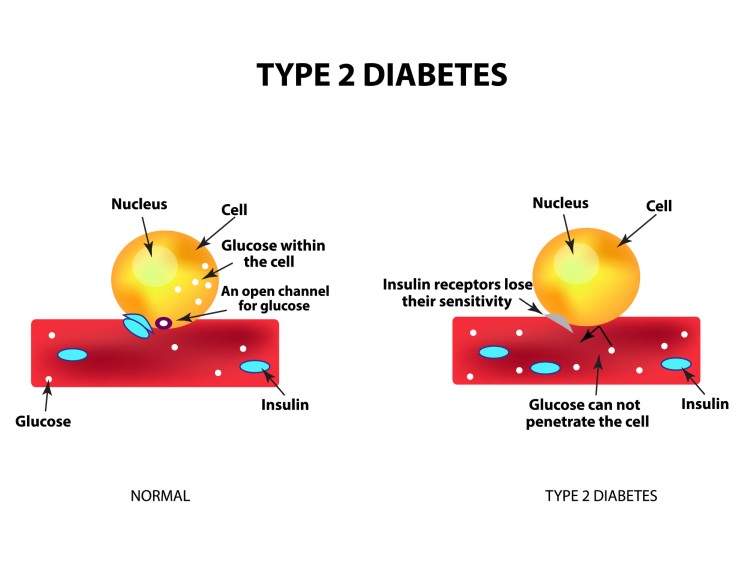
When most people think of diabetes, they don’t think about how it can impact brain function. However, the brain is your body’s main command center, and it needs the right amount of energy to fuel it each day.
For people with type 2 diabetes, this delicate balance can often go haywire, especially when blood sugar levels aren’t stable. As a result, people with type 2 diabetes can experience issues with accelerated brain aging and cognitive decline.
Learning more about how this occurs will help you treat your patients more effectively.
Read on to learn findings that you need to know about how diabetes impacts aging and cognitive decline and what treatment options to consider for your patients if they are diagnosed for type 2 diabetes.
Connection Between the Brain and Diabetes
First, let’s dive deeper into the connection between your brain and type 2 diabetes. Remember, the brain needs glucose to fuel its needs, and this glucose comes from the blood.
In fact, the brain is one of the most energy-demanding organs in the entire body, needing at least one-half of all the available sugar energy in the body.
Therefore, it’s no surprise that an alteration in blood glucose levels can have serious cognitive effects. When people with diabetes experience frequent high and low shifts in their blood sugars, it can cause severe long-term changes.
Hyperglycemia and the Brain
Hyperglycemia or high blood sugar occurs when there is too much glucose in the blood. This can happen when the body doesn’t have enough insulin, or when it isn’t able to use insulin properly.
In most cases, having chronically high blood sugar impacts the brain over time. Even though the brain depends on sugar as its main energy source, that doesn’t mean it functions better in people with high blood sugar.
In fact, the opposite is true. When people have uncontrolled high blood sugar, it causes damage to the blood vessels in the brain. These blood vessels are responsible for carrying oxygen-rich blood that provides nutrients to brain cells.
When the brain doesn’t get enough blood, the brain cells will eventually die. This leads to a condition known as brain atrophy. The loss of brain cells also impacts neuron connections, leading to problems with thinking and memory.
While people can lose brain cells with aging, brain atrophy involves more significant changes than what is expected with typical aging.
Hypoglycemia and the Brain
Hypoglycemia, or low blood sugar, occurs when blood sugar levels drop to dangerous levels, below 70mg/dL. Hypoglycemia can cause severe symptoms when left untreated. When the brain doesn’t have enough sugar, it essentially starts to shut down and causes a lack of oxygen supply. Hypoglycemia affects the brain more immediately, causing symptoms like:
- Dizziness
- Shakiness
- Irritability
- Trouble talking
- Trouble walking
- Seizures
While research hasn’t defined a clear link between low blood sugar and long-term cognitive decline, some studies show dips in blood sugar can have a serious impact on mood. This is also why diabetes and brain fog go hand in hand. If you have chronic low blood sugar, it can cause symptoms like:
- Headaches
- Brain fog
- Fatigue
Diabetes and Brain Aging
Now that you understand more about how hypoglycemia and hyperglycemia impact the brain, it’s time to address how they affect the aging process.
It’s essential to remember there is a massive difference between a normal aging brain and cognitive decline due to diabetes.
The long-term impact of varying blood sugars from type 2 diabetes can actually accelerate the normal process of brain aging. In fact, a recent study of type 2 diabetes, brain aging, and cognitive decline showed that brain aging in people with diabetes occurred at least 26% faster than people without diabetes.
In addition, by the time diabetes is diagnosed, the damage to the brain is often irreversible.
Treatments for Diabetes and Brain Function
While traditional diabetes treatments should always include adhering to medications, dietary changes, and daily exercise, there are other treatments to explore.
If you haven’t yet explored IV therapy treatments for your diabetic patients with cognitive decline, it’s time to learn more about these types of treatments.
Two treatments to consider include:
NAD IV Therapy
NAD stands for Nicotinamide Adenine Dinucleotide, an essential coenzyme in the body, which is central to energy metabolism. It’s found in every cell in the human body and helps with a wide range of functions like creating energy.
It also acts as an antioxidant which helps the body get rid of harmful free radicals found in foods, the environment, and from natural body processes. Too many free radicals can lead to inflammation, which can worsen diabetes.
NAD IV therapy can help the body with various processes, especially in aging people who have chronic illnesses like diabetes.
NAD IV therapy can help to repair damaged DNA and convert food into good energy. This helps cognitive function since it ensures the brain has sufficient energy. This ultimately improves cognitive decline symptoms and helps patients who suffer from the effects of neurogenerative diseases like Alzheimer’s.
Amino Acids
Amino acids are compounds in the body that play a huge role in various bodily functions. They’re the building blocks of all body proteins. These proteins are crucial for tissue repair and maintenance.
Even more, amino acids play a role in regulating neurotransmitters in the brain. The amino acid enzyme known as AMP Kinase (AMPK) can increase energy production in cells, leading to a reduction in blood glucose.
Low amino acid levels can contribute to decreased energy levels and lowered mental sharpness. Some deficiencies can even lead to conditions like depression and anxiety.
While patients can get many amino acids from food sources, supplementation via IV nutritional therapy can be helpful.
Treat Brain Aging from Type 2 Diabetes with IV Therapies
Knowing more about how type 2 diabetes affects brain aging and cognitive decline will help you provide the best treatments for your patients.
To learn about administering IV therapies to your patients, you can turn to International IV Nutritional Therapy. We provide educational seminars across the world for medical professionals with in-depth information and discussion about IV therapies. Our mission is to teach and train you on how to administer safe and effective IV nutritional therapies for all your patients.
Make sure to contact us today for more information about our seminars.



 Fundamentals and Clinical Application of IV Nutrient Therapy
Fundamentals and Clinical Application of IV Nutrient Therapy